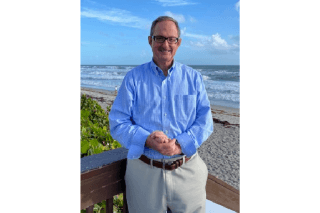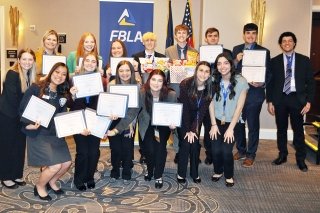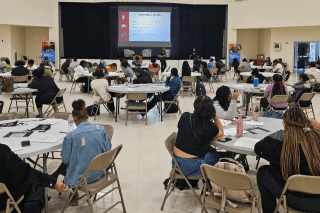Lock Haven alumnus revolutionizes food packing industry
Posted:
Next time you squeeze some ketchup onto a burger or hot dog, think of 1974 Lock Haven State College graduate, Doug Peck.

Peck, a 30-year food packaging innovator, helped revolutionize the industry in the 1980s when he was one of the leaders on the team at the H.J. Heinz Co. responsible for developing the first plastic condiment bottle to ever hit supermarket shelves.
Ever peel off one of those metal lids from a disposable microwave soup or plastic Chef Boyardee container? Peck was among the leadership team responsible for that food packaging innovation, too.
From the family Christmas tree farm in Lewistown, Peck originally had his sights set on becoming a dentist when he landed at The Haven in 1970. By the time he graduated from The Haven, Peck was an Outstanding Student in Chemistry Award winner with an acceptance letter to dental school at the University of Pennsylvania.
During his undergraduate studies, however, Peck decided that dentistry was no longer his professional ambition. Instead, he opted to pursue graduate studies in Penn State University’s Department of Food Science, earning a master’s degree in 1977.
“When I came to Lock Haven, I was a shy little farm boy, but while I was there, I learned how to work with people, how to work on projects and how to lead,” Peck said. “I would put my Lock Haven professors that I had when I was a student up against professors from any college.”
In 1979, just months away from earning his doctorate in food science from Penn State, Heinz offered him a position in their package engineering division. It was an opportunity he couldn’t refuse.
Peck was a key member of the leadership team that developed the first plastic Heinz ketchup bottle, a groundbreaking achievement that forever changed the food packaging landscape. This iconic bottle, with its six-layered plastic technology, extended the shelf life of ketchup to two years, and became the first plastic food container on the market.
After several successful years at Heinz, Peck’s expertise led him to Conagra Brands Inc., where he became director of package engineering. At Conagra, he and his team developed the hybrid plastic-cup/metal-lid technology that has since become an industry standard for countless microwavable products.
Peck then spent the final 19 years of his career in industry at Silgan Containers, one of the world’s largest packaging companies. He retired from industry in 2020.
For the last 23 years, Peck has taught food packaging to students in Penn State’s Department of Food Science. There, he is actively engaged in what he calls the most important work of his career, collaborating with a team of people aiming to eliminate Per- and Polyfluorinated Substances (PFAS) from tissue-paper-like food wrappers ubiquitously used in the fast food industry.
PFAS pose major human and environmental health risks, with links to diseases like breast cancer, autism and endometriosis, among others. Peck and his team believe they are close to potentially eliminating PFAS from food wrappers through a new technology developed from potato starch.
“Out of everything I’ve done throughout my career, I think what we’re working on now is the most important,” Peck said. “To potentially replace PFAS and plastics on the market. We’ve been testing it. We hope to be commercialized with this very soon.”
Peck is also currently two chapters away from authoring a food packaging textbook that he believes will reset the bar for how food-packaging principles are taught in academia by sharing the array of practical insights, hands-on discoveries and firsthand do’s and don’ts from a three-decade food packaging industry leader.
Outside his professional achievements, Peck’s hobbies reflect his diverse interests. As a passionate history enthusiast, he gives tours of the Gettysburg battlefield, a place of personal significance because of his great-great-grandfather’s involvement in the historic battle.
He also conceptualized and created a weekly singles dance for adults over 40 in the Harrisburg area, which averages about 200 attendees weekly. Generously, he donates the revenue generated through these dances to support higher education philanthropic initiatives that benefit students pursuing careers in food packaging.
Peck’s journey from a small-town farm boy to one of the leading names in the world of food packaging is a prime example of the transformative power of public higher education. Through his dedication to teaching and philanthropy, he takes great pride in positively impacting aspiring food packaging professionals, while simultaneously spearheading research aimed at improving human health and safeguarding the environment.



